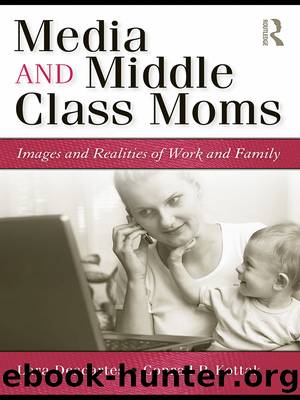Media and Middle Class Moms by Lara J. Descartes Conrad Kottak

Author:Lara J. Descartes, Conrad Kottak [Lara J. Descartes, Conrad Kottak]
Language: eng
Format: epub
ISBN: 9780415993098
Barnesnoble:
Publisher: Taylor & Francis
Published: 2009-02-05T00:00:00+00:00
DECIDING WHO STAYS HOME: WORK/FAMILY ADJUSTMENTS
[My husband would love for me] to get one kick-butt job, and he could just stay home and be Mr. Mom. He would love that, heâs got his gardening, he loves to bake pies, heâs actually more domesticated than I am.
âCassidy, part time working mother of two, married to a full time working father
Gendered norms about marriage, child care, and breadwinning obviously also influence parentsâ decisions about work and family. Audrey, for example, said when she and her husband had both worked they had experienced conflict about who would stay home when one of their children was sick. It was a relief for her to have that behind her once she stayed home full time. Several women reported that their husbands happily endorsed their decision to stay home. Ginny, a stay-at-home mother for several years, had worked full time until her second child was born, then went to part time, then stopped altogether:
Financially we didnât want both of them in babysitting, and financially it wasnât worth me working three days a week. I needed to work full time, and we never wanted to do that. [My husband] has always wanted me just to stay home anyways. And I did, too. I really wanted to be here for the girls.
Some parents said they had discussed having the father rather than the mother stay home, and many phrased this as âbeing Mr. Momâ (after the Michael Keaton movie of the same name) (cf. Deutsch 1999). Few, however, seemed to have considered it seriously. Viewing such an arrangement as a possibility seemed to meet a need to express ideologies of equality between the spouses. Not actually doing it fit with ongoing structural realities and cultural norms of female caregiving and male breadwinning. There were some exceptions. As noted, a few fathers stayed home when they suffered from health problems, and their wives took on more or all of the breadwinning burden. There also were some men who seemed genuinely frustrated with the narrowness of contemporary gender roles. Bryce was married to a woman who, because of a disability, could not work outside the home; she therefore served as primary caregiver for their child. Bryce said he would prefer a different situation: âI wish I could stay home and that [my wife] had the career. I would do it in a second ⦠thereâs nothing that has given me as much pleasure as my son, nothing that I have done.â Bryce described his impatience with standard gender roles regarding child care and work:
Thereâs one woman [at my old workplace], who [said], âI want to get married, I want kids, but I want to work. My husband doesnât, but itâs the husband who should work.â ⦠Itâs just so caught up in roles that they think they should be doing. Hereâs a case, she doesnât want to stay home, her husband does. I donât understand. Iâd stay home in a heartbeat.
For most parents, however, earning the principal family income still was seen as a manâs responsibility.
Download
This site does not store any files on its server. We only index and link to content provided by other sites. Please contact the content providers to delete copyright contents if any and email us, we'll remove relevant links or contents immediately.
| Africa | Americas |
| Arctic & Antarctica | Asia |
| Australia & Oceania | Europe |
| Middle East | Russia |
| United States | World |
| Ancient Civilizations | Military |
| Historical Study & Educational Resources |
Cat's cradle by Kurt Vonnegut(15312)
Pimp by Iceberg Slim(14470)
4 3 2 1: A Novel by Paul Auster(12358)
Underground: A Human History of the Worlds Beneath Our Feet by Will Hunt(12078)
The Radium Girls by Kate Moore(12006)
Wiseguy by Nicholas Pileggi(5756)
The Fire Next Time by James Baldwin(5417)
Perfect Rhythm by Jae(5388)
American History Stories, Volume III (Yesterday's Classics) by Pratt Mara L(5290)
Paper Towns by Green John(5167)
Pale Blue Dot by Carl Sagan(4987)
A Higher Loyalty: Truth, Lies, and Leadership by James Comey(4942)
The Mayflower and the Pilgrims' New World by Nathaniel Philbrick(4482)
The Doomsday Machine by Daniel Ellsberg(4476)
Killers of the Flower Moon: The Osage Murders and the Birth of the FBI by David Grann(4428)
The Sympathizer by Viet Thanh Nguyen(4376)
Too Much and Not the Mood by Durga Chew-Bose(4324)
The Borden Murders by Sarah Miller(4299)
Sticky Fingers by Joe Hagan(4178)
